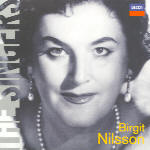Birgit Nilsson’s timbre, as the late John Ardoin writes in the booklet notes, “was sunlight reflected off a copper surface.” That bright, gleaming tone could cut through any orchestra in full cry, “like a marble column from its lowest notes to the high C of its top register” (Ardoin again). Put simply, she was a force of nature, a commanding presence who dominated the Wagnerian repertoire. For listeners unfamiliar with her art this compilation will serve as a worthy introduction; for the rest of us it will stand as a satisfying reminder of her excellence.
That, at least, is my reply to the question immediately raised in my mind about this disc and its companions in Universal’s “The Singers” series. The Nilsson CD is among the first releases in that series, which will encompass singers from Frida Leider’s acoustics (for a review, type Q4271 in Search Reviews) to Leontyne Price’s digital efforts (type Q4270). Presumably, each release tries to give a rounded picture of a particular singer’s art in an hour-plus of arias and songs. In Nilsson’s case, it succeeds admirably, presenting her in several Wagner selections and including arias by Beethoven, Weber, and Verdi, along with a trio of traditional Christmas selections. In some others of the series, the choices are just plain weird, often unflattering to the artists Universal is trying to exalt.
But the “who’s it for” question arises from the packaging and extras. Universal hops on the multimedia bandwagon with “features accessible via your PC/Macintosh ROM-drive”. What features? Texts and translations, an artist discography, a picture gallery (click on the thumbnail photo and you see it slightly enlarged), and links to the artist’s website (if any). Big deal. Does anyone actually listen to classical music via computer? Can a voice like Nilsson’s, barely contained by top-drawer audio equipment, sound like anything but Minnie Mouse’s via a computer’s tinny speakers? Look again at those “features”: all (except for the web links) are what we used to get in the dear old technology of printed booklets–and in more convenient form, too. Did anyone at Universal pipe up at what must have been endless planning meetings to suggest that if the texts and translations were printed in the booklet they might actually be more useful to the 99.9 percent of listeners who will not be at their desks while playing the disc? And did anyone notice that occasionally other companies’ multimedia efforts actually make good use of the new capabilities by projecting the score on screen so you can follow it as you’re listening to the music? Or did the suits squash such timid objections by pointing out that the words “multimedia” and “ROM-drive” would wean the youth market away from rap?
Aside from the triumph of marketing illusions over common sense, what we’re left with is a decent single-disc overview of major aspects of Nilsson’s recordings. The highlights by far are the Tristan und Isolde “Liebestod” and the Götterdämmerung “Immolation Scene”, drawn from the classic Bayreuth recordings led by Karl Böhm. The three last items on the disc cast an interesting light on Nilsson’s art–Adam’s “O holy night”, Franck’s “Panis angelicus”, and Grüber’s “Silent Night”–all recorded with organ accompaniment in Stockholm in 1963. I felt queasy when I saw them listed on the back of the disc, my fear of treacly sentimentality overcoming the amusement of finding “O holy night” immediately following “Du bist der Lenz” from Die Walküre, an inventive programming juxtaposition I had thankfully never before encountered. But Nilsson sings those three pieces, so often mangled by prima donnas, with unpretentious simplicity, her voice soaring along with the discreet organ.
The rest of the disc reproduces a 1966 LP with Edward Downes that offers some thrilling singing while also confirming some long-standing criticisms of Nilsson’s art. In the “Abscheulicher” aria from Beethoven’s Fidelio, the opening is exciting but the necessary warmth in the “Komm, Hoffnung” section isn’t at quite the right temperature. Other singers also have injected more feeling into Weber’s “Leise, leise” from Die Freischütz, and arias from Verdi’s Nabucco and La forza del destino fall short of being idiomatic. Nilsson’s “Dich, teure Halle” from Tannhäuser, powerful though it is, doesn’t have the humane characterization that Frida Leider, in a companion Singers release, brings to it. But these are minor cavils. What we do have here is one of the great singers of the past half-century in her prime, and that’s more than enough to recommend this disc. [12/17/2001]
































